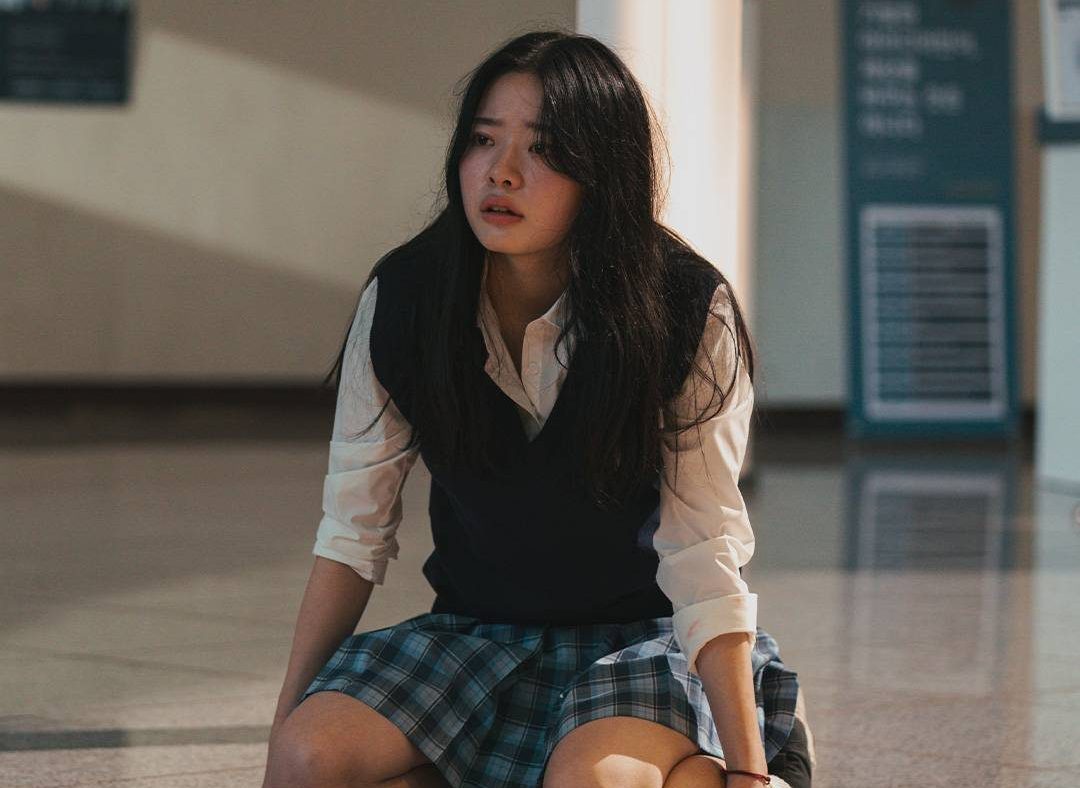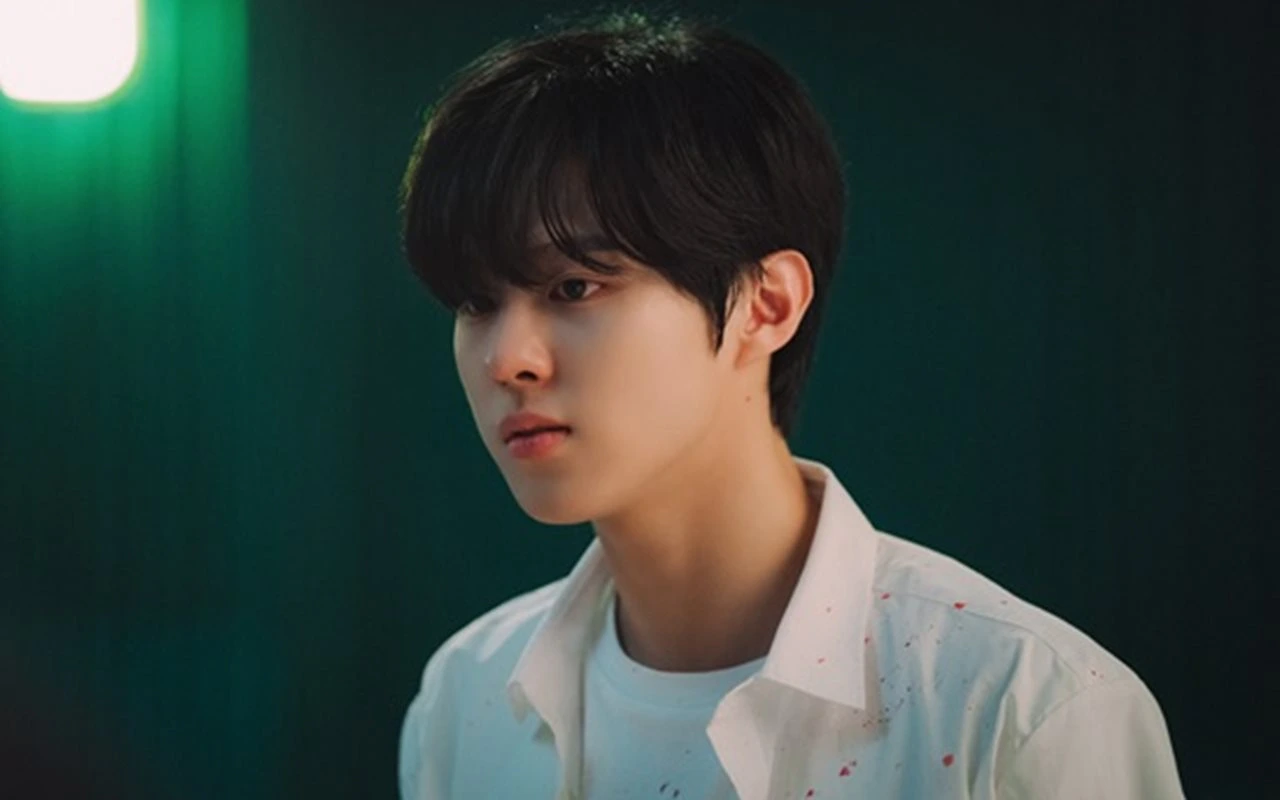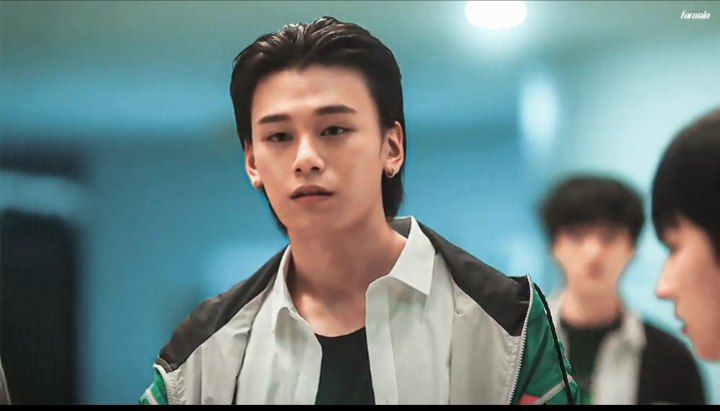The plot of Night Has Come takes an unexpected turn when Ko Kyung-Jun, a simple civilian, is brutally murdered by Duo-Fan without any chance to defend himself. The narrative becomes even more complicated when characters suspect the involvement of others, as Duo-Fan and Kim Zhao-Wei frequently use the word “we” in conversations, leaving the true number of killers unclear. Yoon-Seo discovers a new photo in a cabinet that differs from the previous one; this photo includes all the classmates, not just a single unfamiliar girl.
Suddenly, everyone experiences a flash of light, triggering the collective memory of a student named Park Se-Eun. This is a moment as it reveals the possibility of erasing and restoring memories. After regaining their memories, the group begins to question who could have organized this twisted game. As the discussions unfold, suspicion falls on the killers, particularly regarding who may have been responsible for Park Se-Eun’s suicide. Ro-Hi, feeling guilty, approaches Kim Zhao-Wei, but he refuses to reveal the truth out of fear of being branded a killer.
Kim Zhao-Wei then manipulates a female student, convincing her to vote for Ro-Hi instead of Duo-Fan, changing the course of the game. The complex web of accusations and alliances deepens. Meanwhile, Jun-Hee finds Kyung-Jun’s phone in the warehouse, casting further doubt on Duo-Fan. Duo-Fan, however, deflects suspicion, blaming two others. Amidst the mounting tension, Kim Zhao-Wei accuses Ro-Hi of causing Park Se-Eun’s death, and in response, Ro-Hi reveals her true identity as an undercover police officer. She exposes Kim Zhao-Wei’s role as one of the killers using the phone.

Night Has Come Ending Explained
The intense conflict suggests that this deadly game is part of a large hypnotic event orchestrated by the police to uncover the truth behind Park Se-Eun’s death. The stakes grow higher as the main culprit begins to emerge from the web of intrigue. The supernatural aspects of the game, which seem to revolve around hypnotism and dreams, are crucial in resolving this life-or-death scenario.
In Night Has Come Episode 10, Ro-Hi, the undercover police officer, is found dead despite her best efforts to hide in the ceiling. This event raises more questions, especially about the killers’ strategies. Were they searching for victims throughout the night, or did they have an uncanny ability to anticipate the characters’ movements? The story hints that there may still be another hidden killer—Jung-Yeon, a character whose quiet demeanor makes her an unlikely suspect but a potential danger nonetheless.
Jung-Yeon uncovers a bloodstain above her, leading to suspicions about whether the blood is self-inflicted, perhaps to mislead others. As the plot advances, more characters begin to suspect each other. The game, already perilous, becomes even more complicated, as Duo-Fan, tricked by Yoon-Seo’s plan, goes to check the restaurant footage, and the chubby student is found injured. Who will the remaining civilians choose to vote for in the next round?
The Complexity of the Game: Episode 11
The game grows increasingly challenging, with multiple killers and only one police officer and one doctor left, both of whom are easy targets. The killers, bound by a system that prevents them from revealing each other’s identities, face their own challenges. Kim Zhao-Wei comes close to exposing the truth but is silenced by the system before he can act. Before his death, Zhao-Wei makes a discovery—the statue represents Park Se-Eun, the student who committed suicide. In a heartbreaking moment, Zhao-Wei takes his own life in front of the statue.
Episode 11 sheds light on crucial rules of the game, such as the fact that killers can eliminate more than one person in a day. This revelation helps explain why the game has dragged on for so long. Jung-Yeon is shown as the final undisclosed killer, and her role becomes clear. Without her involvement, Yoon-Seo and the others would have likely been eliminated much sooner, as Zhao-Wei could have killed everyone in a single day. Jung-Yeon’s role has been pivotal to the survival of the remaining contestants.

Unexpected Alliances and Strategic Moves
The chubby student turns out to be just a civilian, and his injury was part of a setup. Jung-Yeon’s strategic vote against him allows Duo-Fan to survive. Jung-Yeon could have sacrificed him to further her own agenda, but instead, she decides to play a more complex role, delaying her own killings and deciding whether to sacrifice herself or claim the title of the ultimate killer.
Meanwhile, Jun-Hee is unable to bring himself to kill his classmate Duo-Fan. He pleads for Duo-Fan to take his life to spare the others. Yoon-Seo begins to suspect that Jung-Yeon is the true killer and implores her to end the suffering. After everyone falls asleep, Duo-Fan proposes a mass elimination of all survivors. However, Jung-Yeon persuades him to target others while she focuses on Yoon-Seo and Jun-Hee. Duo-Fan delights in his murder spree, but Jung-Yeon unexpectedly spares the two.
Final Betrayals and the Revelation
As the story reaches its climax, Duo-Fan and Jung-Yeon discover that Yoon-Seo’s phone is still active, indicating she is still alive. They check the freezer, only to realize Jung-Yeon’s plan. Duo-Fan, now aware of the scheme, decides to eliminate her as well. However, this move appears to violate the rules of the game, leading to his own self-elimination by the system. In the end, the trio of main characters—Yoon-Seo, Jun-Hee, and Jung-Yeon—are left to face the consequences of their actions.
Episode 12: The Final Twist
The ending of Night Has Come takes a surreal turn. It turns out that the game was not a result of hypnosis, but rather a brain-machine game created by Park Se-Eun’s parents. These parents, driven by grief over their daughter’s bullying and suicide, trapped all the students in this twisted game through unknown methods. They created the character of Jung-Yeon to ensure she always emerged victorious. The game, it seems, has been running for multiple rounds, with Jung-Yeon previously sacrificing herself to help Yoon-Seo, leading to her side’s defeat.

Jung-Yeon’s role as a civilian is revealed, with her team winning if she survives. It’s suggested that in previous games, Yoon-Seo may have died early, allowing Jung-Yeon to gain awareness of the game and her role in it. After revealing the truth, Duo-Fan’s fate becomes irrelevant. His escape from the freezer no longer matters, as he is trapped in the cycle of the game. What initially seemed like a quest to uncover Park Se-Eun’s tormentor turns out to be a much broader and more complex scheme, with Se-Eun’s parents indiscriminately targeting all the students.
The Unforeseen Consequences of Revenge
In a poignant moment, Se-Eun’s father expresses a desire to end the game, but his wife firmly disagrees. The game continues, but Yoon-Seo’s memory remains intact, which adds a layer of tragic irony. She is the only one who starts the game with full knowledge of the truth, and her suffering is far deeper than that of the other participants. This raises the unsettling question: did Se-Eun’s parents target the wrong individuals in their quest for revenge?
The finale shows Yoon-Seo waking up in the car, smiling at Jun-Hee, only to see Jung-Yeon sitting expressionless in the back row. This final moment hints at Yoon-Seo’s inevitable doom in this round. The setting mimics modern technological advances, suggesting that what the characters have experienced may be a representation of a greater, more profound truth about the nature of their reality.
Comparison with “Singularity”
The plot of Night Has Come shares thematic similarities with the novel Singularity, where the protagonist explores a world full of mysteries and challenges the understanding of reality. In Singularity, Noah’s Ark is not just a legendary tale but a metaphor for our contemporary lives, posing the question: if the Ark cannot be found, do we truly understand the reality we inhabit? Similarly, in Night Has Come, the characters’ world seems to be controlled by an unseen force, trapping them in a virtual reality governed by the game’s creators. Both narratives invite reflection on the mysteries of existence and the boundaries between reality and illusion.





